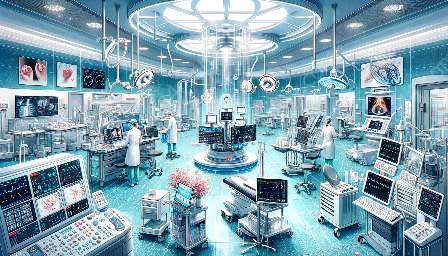Biosensors and medical diagnostics play a crucial role in healthcare, combining advances in biophysics with innovative medical devices to revolutionize patient care.
Understanding Biosensors and Their Function
Biosensors are analytical devices that combine a biological component with a physicochemical detector, allowing for the detection and quantification of biological molecules. They have a wide range of applications, from medical diagnostics to environmental monitoring.
Principles of Biosensors:
- Biological Component: Typically comprises enzymes, antibodies, or nucleic acids that recognize the target analyte.
- Transducer: Converts the molecular recognition event into a measurable signal, such as optical, electrochemical, or piezoelectric signal.
- Detector: Records and translates the transduced signal into a readable output, often in the form of a digital display or graphical representation.
Biophysics and Biosensors
Biophysics, the study of the physical aspects of biological processes, provides fundamental insights into the functioning of biosensors. Understanding the molecular interactions, conformational changes, and energy transfer processes is essential for the design and optimization of biosensor devices.
Biophysical principles guide the selection of appropriate biological recognition elements, the optimization of transduction mechanisms, and the improvement of the overall sensitivity and specificity of biosensors. Advances in biophysics have enabled the development of biosensors that can detect biomarkers with high precision and accuracy, leading to significant advancements in medical diagnostics.
Medical Diagnostics and Disease Management
Medical diagnostics encompass a wide array of techniques and technologies aimed at identifying the presence of diseases or medical conditions. Biosensors have emerged as powerful tools within the field of medical diagnostics, offering rapid, sensitive, and specific detection of biomarkers associated with various diseases.
By leveraging the principles of biophysics, biosensors have facilitated the early diagnosis and monitoring of diseases ranging from infectious illnesses to chronic conditions such as diabetes and cardiovascular disorders. The integration of biosensor technology with medical devices has enabled point-of-care testing, remote monitoring, and personalized medicine approaches.
Impact on Healthcare
The convergence of biosensors, biophysics, and medical devices has led to transformative changes in healthcare delivery. The ability to perform rapid and accurate diagnostic tests at the point of care has improved patient outcomes, reduced healthcare costs, and enhanced accessibility to medical services in resource-limited settings.
Biosensors integrated with medical devices, such as wearables, implantable sensors, and diagnostic equipment, have empowered patients to take a more active role in managing their health. Real-time data monitoring and feedback mechanisms have enabled personalized treatment plans and early intervention strategies, ultimately contributing to improved patient care and disease management.
Future Perspectives and Technological Advancements
The field of biosensors and medical diagnostics continues to evolve, driven by advancements in biophysics and medical device technology. Innovations in miniaturization, wireless connectivity, and data analysis algorithms are pushing the boundaries of point-of-care testing and remote monitoring.
Furthermore, the integration of biosensors with emerging technologies such as artificial intelligence, nanotechnology, and microfluidics holds great promise for enhancing the sensitivity, specificity, and multiplexing capabilities of biosensor devices. These developments are anticipated to further revolutionize medical diagnostics and pave the way for personalized and precision medicine approaches.
Conclusion
Biosensors and medical diagnostics represent a dynamic and interdisciplinary field that bridges biophysics and medical devices. The synergy between these domains has catalyzed innovations in healthcare, offering novel solutions for disease detection, management, and personalized patient care. As the landscape of biosensor technology continues to evolve, its impact on medical diagnostics and the broader healthcare ecosystem is poised to be increasingly profound, ushering in an era of precision medicine and improved health outcomes.


